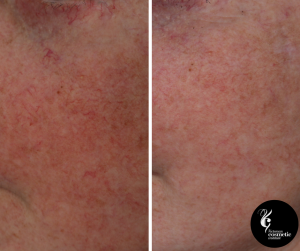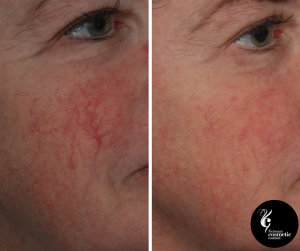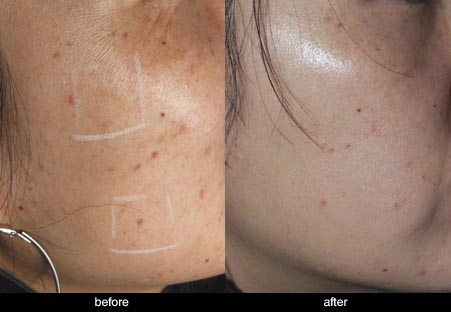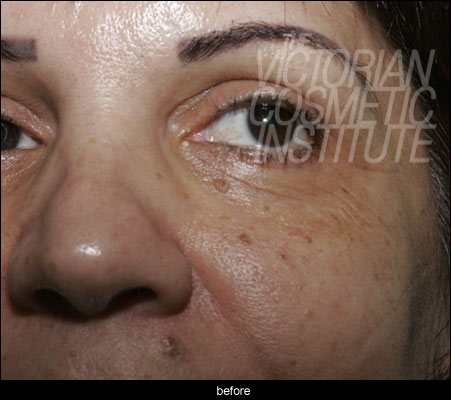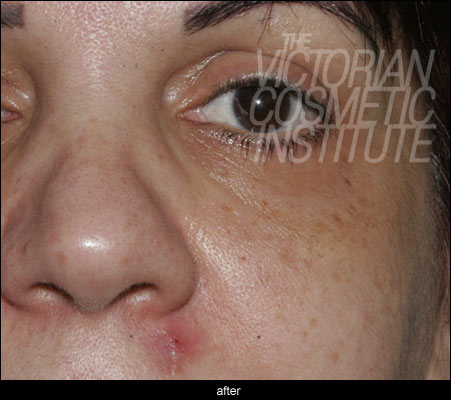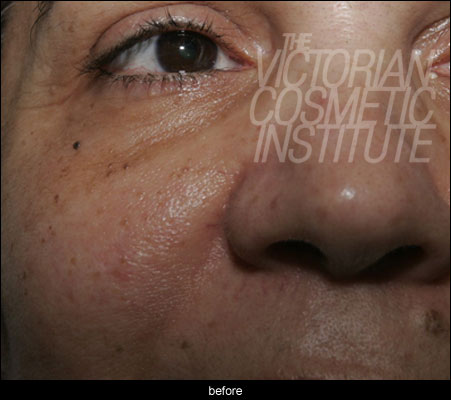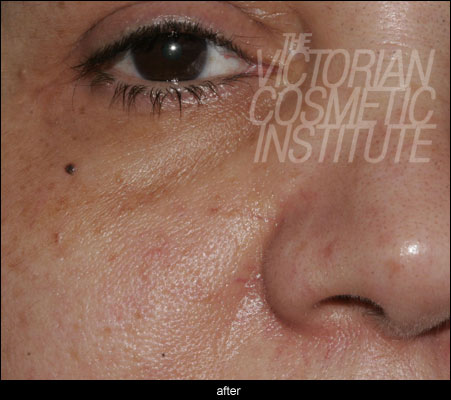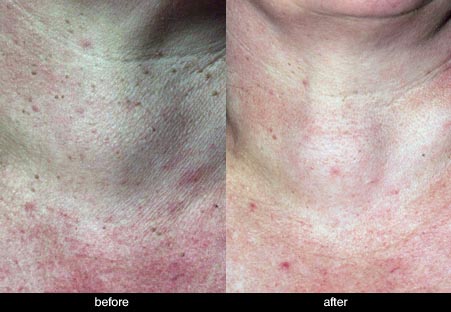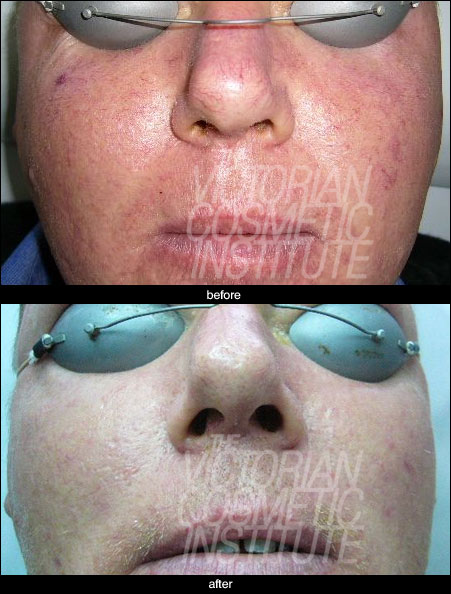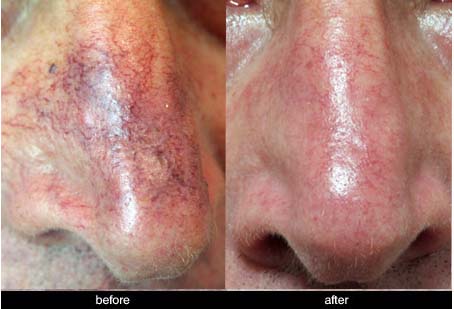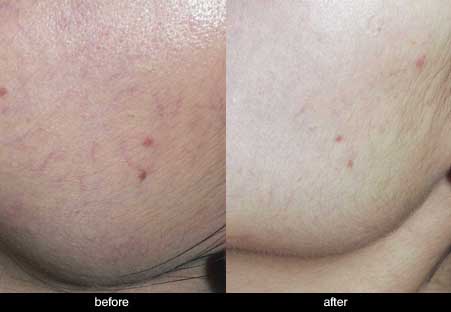Quick facts
- The Gemini laser is particularly suited to the treatment of vascular conditions such as broken facial capillaries, rosacea, and port wine stains (red birth marks).
- It is also particularly suited for the treatment of pigmentation concerns such as freckles (especially on asian skins), seborrhoiec keratosis, and dermatosis papulosa nigra
What is the Gemini Laser?
There are a number of medical lasers, each designed to target different problems. This page will discuss the Gemini laser, which has two frequencies for the treatment of skin conditions, namely, 532 nanometres (KTP), and 1064 nanometres (Nd:YAG). The light of KTP laser will be selectively attracted to the blood in capillaries and the melanin in skin, making it an ideal laser for treating broken capillaries, rosacea, freckles, sunspots and pigmentation. The Nd:YAG laser is a deeper penetrating laser that can be used to treat spider leg veins, deeper facial veins, and to selectively remove hair follicles.
What can be treated?
The Gemini Laser at Victorian Cosmetic Institute can selectively treat a variety of skin problems with minimal or no disruption to the surrounding normal skin;
- pigmentation, sunspots, freckles, sun-damaged skin (532nm KTP)
- capillaries, and rosacea (532nm KTP)
- removal of some raised spots e.g seborrhoiec keratosis, dermatosis papulosa nigra, skin tags (532nm KTP)
- treatment of pseudofolliculitis or ingrown hairs (1064nm Nd:YAG)
- treatment of hair removal (1064nm Nd:YAG)
- treatment of leg veins, capillaries (1064nm Nd:YAG)
- treatment of venous lakes (1064nm Nd:YAG)
- port wine stains (532nm KTP)
The Gemini Laser cannot treat moles or skin cancers.
It is most commonly used on the ; face, neck, chest, back, and hands.
Pigmentation
The Gemini laser treats pigmentation with the 532 nm KTP wavelength. The energy from this light is selectively absorbed by the melanin that causes pigmentation. This causes a photo-thermal injury to the melanin, and this leads to its disruption and subsequent removal by the body’s immune system. It generally takes 1 to 3 treatments to lighten or remove unwanted pigmentation with the Gemini laser. With most laser pigmentation removal, the pigmentation becomes darker for approximately one week and then flakes off. The treatments are spaced at least 1 month apart. There is also usually some redness and mild swelling in the treatment areas for a few days after treatment.
Skin pigmentation in most cases is better treated with our q-switched lasers, ie the Medlite and Ruby lasers, that emit much shorter and higher energy pulses than the Gemini laser. However, the Gemini laser does have advantages, especially in those with olive or darker skins which are more prone to complications with lasers. For example, the treatment of freckles or sunspots on Asian skin, olive, or darker skins is best performed with the Gemini laser treatment as it has contact cooling that protects the skin overlying the pigmentation and in comparison to the q-switched lasers has less risk of damage to the skin.
The Gemini laser’s 532nm wavelength does not penetrate very deeply, and therefore pigmentation that is too deep for the laser may not be treatable – for example, melasma, a type of pigmentation caused by the pill or pregnancy, is difficult to treat as it spans many layers of the skin. In some cases it may be appropriate to use the other lasers available at Victorian Cosmetic Institute to remove pigment. The Q-switched Nd:YAG (Medlite) or Ruby laser, which we usually use to remove tattoos, is excellent for deeper skin pigmentation removal.
Treatment of raised spots
Some raised spots or skin lumps and bumps on the face, neck and body can be treated with the Gemini laser. Note that moles (naevi) and skin cancers cannot be treated with the Gemini laser.
Seborrhoiec keratosis, which are raised brown spots that look like a ‘stuck-on sultana’ can be treated with the Gemini laser’s 532nm wavelength. A very high energy setting is used to ablate the raised tissues. The lesion becomes grey and then scabs and flakes off. Usually 1-2 sessions are required for this treatment.
Deramtosis papulosa nigra are raised dark brown/black spots usually seen on the cheeks of olive or darker skinned patients. They look like ‘stuck-on coco pops’. Again a very high energy setting is used on the 532nm wavelength which ablates these lesions.
Skin tags are skin coloured raised spots usually found on the neck, underarms, and face and can also be removed with the 532nm wavelength in a similar manner.
Raised skin lesions can also be removed with radiowave surgery or the erbium laser.
Capillaries and rosacea
The Gemini laser treats facial capillaries and rosacea with the 532 nm KTP laser. The energy from this light is attracted to oxyhaemoglobin, a constituent of blood. This closes off any superficial blood vessels and reduces capillaries, redness, and flushing. Usually 1 to 3 treatments are required at monthly intervals. Because of its specificity to oxyhaemoglobin, the KTP laser is one of the best lasers for facial capillaries. There usually is some facial swelling after the procedure, and this may last for 3 days. There may also be an increased amount of redness (temporary) following the treatment.
Laser hair removal is no longer provided at VCI. The below is for information purposes only.
Laser hair removal/treatment of pseudofolliculitis (in-grown hairs)
Long term hair reduction can be achieved with the Gemini’s 1064nm Nd: YAG laser. The laser is selectively absorbed by the melanin present in the hair follicle. As a result, very fine, light or grey hairs can not be treated. The laser induces death of the hair follicle stem cell which can lead to permanent hair reduction – as opposed to plucking or waxing which only temporarily removes the hair. Generally 6 to 8 treatments are required at 4 to 8 week intervals. The amount of hair reduction achieved is in the order of 60 to 80%. One of the main advantages of the Nd:YAG laser is that it is the safest hair removal laser for darker skins. It is also particularly suited to the treatment of ingrown facial and neck hairs.
Treatment of spider leg veins and deeper facial veins
The 1064nm Nd:YAG can be used to reduce the presence of small spider leg and deeper facial veins. The 1064nm wavelength penetrates through the skin and the energy from this laser is absorbed by the haemoglobin in the leg/facial veins and this closes it down. This wavelength penetrates the skin deeply, and reaches targets than cannot be reached with the 532nm wavelength. Note that only spider leg veins and not varicose veins are treatable with this laser. It generally takes 1 to 2 treatments spaced at montly intervals to improve the appearance of leg/facial veins. Mostly, these veins disappear immediately after treatment, but some can be partially disrupted and take a few weeks to reduce.
Treatment of venous lakes
Venous lakes are blue to violet lesions that are usually found on the lower lip or ears. They are a dilation of the underlying veins, and can be usually treated in one session with the Gemini laser’s 1064nm wavelength. A distinct popping sound is heard when the venous lake is treated.
Port wine stain treatments
Port wine stains are congenital vascular malformations in the skin that lead to a reddish/purple discolouration of the skin. The 532nm wavelength from the Gemini laser is highly attracted to the haemoglobin (blood) in this birthmark. This shuts down the abnormal vessels, and reduces the discolouration of the skin. Usually multiple treatments are required, and commonly, complete resolution is not achieved.
Click here to learn more about port wine stains and their treatment
Why choose Victorian Cosmetic Institute to perform your laser treatment?
At Victorian Cosmetic Institute, we use the latest laser technology to perform your treatment. The Gemini laser is an extremely safe and effective laser for the removal of pigmentation and capillaries. Due to its specificity, it can be a lot safer and effective than other IPL systems/treatments.
Our doctors are also highly experienced in laser treatments, and will be able to give you the best advice for your treatment.
The first step is simply contacting us for your initial laser skin rejuvenation consultation, where we will discuss with you what is a realistic and achievable outcome, and what to expect from your laser treatment.
Making that first phone call about any cosmetic procedure can be a confronting task – many of our patients have preferred filling out our online enquiry form. We can then contact you with an understanding of the results you are hopeful of achieving and ensure the treatment is appropriate.
It’s as easy as clicking the “book online” button above and completing the provided form.
Otherwise, you can phone us directly on 1300 863 824.
